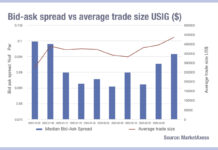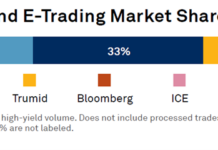Bond markets are following the same pattern as equity markets did in the 1990s, according to Coalition Greenwich’s Kevin McPartland, becoming more electronic trading-driven.
The growth of electronic trading in the corporate bond market, increased retail demand for bonds and the potential for market reforms from the SEC have stirred hopes that the equitisation of the bond market could become a reality, Coalition Greenwich’s Kevin McPartland says, encouraging new entrants and making the market more efficient.
In September 2024, 50% of US IG corporate bonds were traded electronically. Tracing how bonds have got to this point, McPartland looks back to the early use of electronic trading in the market. Growing confidence in electronic trading initially prompted trade volumes to increase; now, they are on downsizing as large orders are more commonly broken down by electronic portfolio trading, systematic market makers and quant investment strategies. Between 2014 and 2023, the average size of a bond trade has dropped from US$578,000 to US$373,000, according to TRACE data.
As trades are reducing in size, McPartland says, trading venues are trying to make electronic block trading more efficient. This is increasing competition, but equally worsening liquidity fragmentation. Some systemic investors and traders are exploiting this to make money from exchange arbitrage, which McPartland notes helps to keep prices reflecting real supply and demand.
McPartland warns that while equity market strategies can be beneficial to the bonds space, “they can’t just be cut and pasted”. Differences between the two markets, such as greater pre-trade transparency and the ability to determine price in equities, mean that a nuanced adoption is required.
With electronic trading on the rise, fund managers are now more focused on portfolio trades and overall market liquidity rather than specific block trade prices, McPartland comments. Similarly, clients are increasingly reliant on dealers to interpret the bigger picture: trading venue dynamics, changes to protocol and market structure amendments. “Relationships still matter and will always matter. But what constitutes a meaningful relationship is evolving, as it did in the equity market a decade or more ago,” he observes.
©Markets Media Europe 2024
























